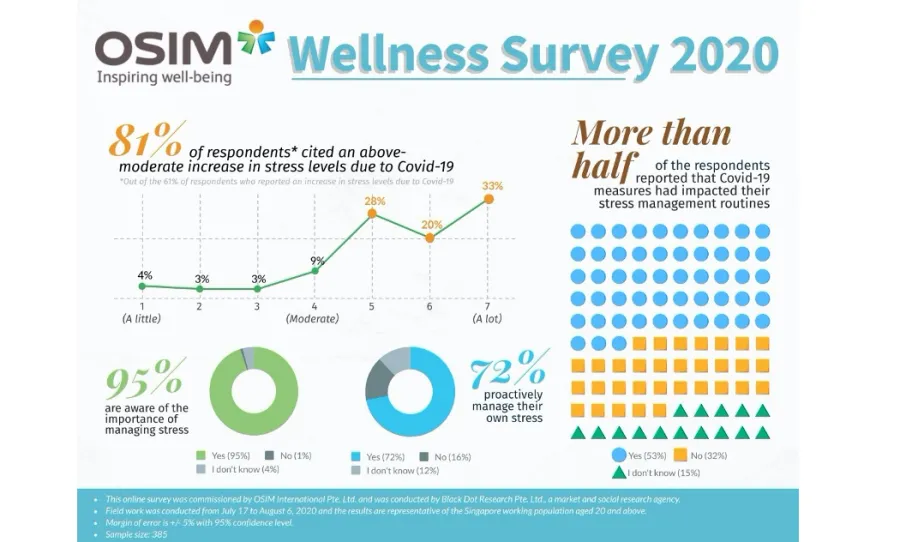
Stress levels rise as COVID-19 disrupts Singaporeans' lifestyles
More than 50% said that their stress management activities were disrupted.
Majority of Singaporean workers indicated that their stress levels edged up since the COVID-19 pandemic begun, as their lifestyles were severely disrupted by the circuit breaker measures as well as changes happening in the workforce.
More than eight in ten or 81% of respondents reported above to moderate increase in their stress levels between July to August, according to results from an online wellness survey conducted by healthcare company OSIM International.
Of the 385 respondents—comprised of the workers aged 20 and above—61% identified the COVID-19 pandemic as the reason for their heightened distress.
One third or 33% also indicated that their stress levels increased by ‘a lot.’
At the same time, more than 50% of respondents said that their usual stress management activities have been disrupted.
These forms of stress relief include gym workouts, wellness treatments such as massages, as well as group sports.
However, there is a notable increase on individuals and families are preferring to de-stress and unwind in their homes.
“As lifestyles shift and routines continue to be disrupted by COVID-19, the survey results indicate that individuals and families increasingly prefer de-stressing and unwinding in their own homes instead of heading out,” said Lynn Tan, deputy CEO of OSIM International.
“We believe that this new normal will encourage more people to take better care of their well-being on a daily basis,” she added.
The survey, which sought to learn more about what causes the public stress as well as their relieving tactics, also found that Singaporeans have strong awareness of the detrimental effects of stress on their health. Sixty-eight (68%) said that stress can cause mental health illnesses such as depression, anxiety, and panic attacks.
Meanwhile, 63% said that they have knowledge on how stress can cause sleeping difficulties, whilst 61% said that it can reduce overall immunity.
However, OSIM noted that more education is needed to inform the public on how stress is associated with cardiovascular issues, diabetes, and Parkinson’s Disease, with only 35%, 21%, and 10% indicating knowledge of these, respectively.


![SBR 5 Lorem Ipsum News 2 [8 May]](https://cmg-qa.s3.ap-southeast-1.amazonaws.com/s3fs-public/styles/exclusive_featured_article/public/2025-05/a_hand_pointing_to_a_futuristic_technology_5b87c9d0e3_3.png.webp?itok=M3Hf-9XR)
![SBR 4 Lorem Ipsum [8 May Top Stories]](https://cmg-qa.s3.ap-southeast-1.amazonaws.com/s3fs-public/styles/exclusive_featured_article/public/2025-05/a_hand_pointing_to_a_futuristic_technology_5b87c9d0e3_2.png.webp?itok=2m5Wl0MX)


![Exclusive three SBR 12 Lorem Ipsum [8 May]](https://cmg-qa.s3.ap-southeast-1.amazonaws.com/s3fs-public/styles/exclusive_featured_article/public/2025-05/a_hand_pointing_to_a_futuristic_technology_5b87c9d0e3_11.png.webp?itok=8kn_UIfA)
![SBR 3 Lorem Ipsum [ Exclusive 2]](https://cmg-qa.s3.ap-southeast-1.amazonaws.com/s3fs-public/styles/exclusive_featured_article/public/2025-05/a_hand_pointing_to_a_futuristic_technology_5b87c9d0e3_1.png.webp?itok=YCyjLegJ)
![SBR 2 Lorem Ipsum [8 May]](https://cmg-qa.s3.ap-southeast-1.amazonaws.com/s3fs-public/styles/exclusive_featured_article/public/2025-05/a_hand_pointing_to_a_futuristic_technology_5b87c9d0e3_0.png.webp?itok=_cKD-29o)

![Video [Event News]](https://cmg-qa.s3.ap-southeast-1.amazonaws.com/s3fs-public/styles/event_news_featured_article/public/2025-05/screenshot-2025-05-08-at-4.58.53-pm_0.png.webp?itok=Kud35sMs)
![Event News SBR 9 Lorem Ipsum [8 may]](https://cmg-qa.s3.ap-southeast-1.amazonaws.com/s3fs-public/styles/event_news_thumbnail/public/2025-05/a_hand_pointing_to_a_futuristic_technology_5b87c9d0e3_8.png.webp?itok=DTh_dbYp)
![Event News SBR 9 Lorem Ipsum [8 May]](https://cmg-qa.s3.ap-southeast-1.amazonaws.com/s3fs-public/styles/event_news_thumbnail/public/2025-05/a_hand_pointing_to_a_futuristic_technology_5b87c9d0e3_7.png.webp?itok=vzDAzb6V)
![Event News SBR 8 Lorem Ipsum [8 May]](https://cmg-qa.s3.ap-southeast-1.amazonaws.com/s3fs-public/styles/event_news_thumbnail/public/2025-05/a_hand_pointing_to_a_futuristic_technology_5b87c9d0e3_6.png.webp?itok=jvHFc4P6)
![Video [Event News]](https://cmg-qa.s3.ap-southeast-1.amazonaws.com/s3fs-public/styles/video_thumbnail/public/2025-05/screenshot-2025-05-08-at-4.58.53-pm_0.png.webp?itok=yZnI0YBb)
![Video 1 SBR [8 May]](https://cmg-qa.s3.ap-southeast-1.amazonaws.com/s3fs-public/styles/video_thumbnail/public/2025-05/screenshot-2025-05-08-at-4.58.53-pm.png.webp?itok=9AAeRz_k)

 Advertise
Advertise

